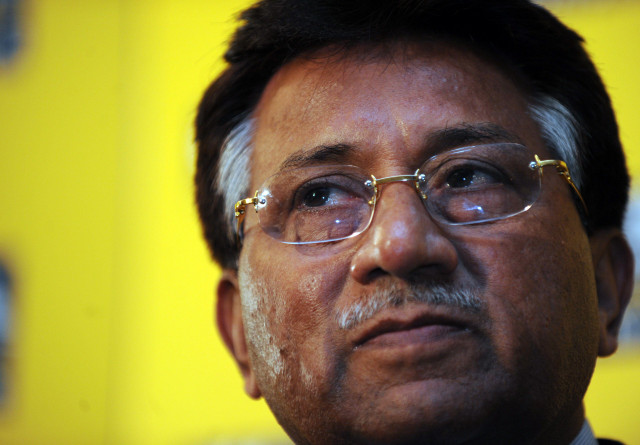Treason case: Musharraf’s team wants trial moved to military court
Lawyer claims PML-N govt holds grudge against his client.

Former president General (retd) Pervez Musharraf. PHOTO:AFP
A lawyer for General (retd) Pervez Musharraf reignited debate on Monday by questioning the special court’s jurisdictional power to conduct the high treason trial against the former military ruler.
Citing several provisions of the Army Act, Dr Khalid Ranjha requested that the Justice Faisal Arab-led three-judge bench transfer the high treason case to the commanding officer of the applicant’s regiment for trial by court martial.
“From time to time, successive governments did not consider it a crime and did not take any action to indict the petitioner on the account,” said Ranjha. “Instead, Musharraf was given a red carpet farewell.”
After seven years, Ranhja said, a case of high treason was initiated against Musharraf. “This delayed action by itself speaks for the malice behind it,” he said.

Musharraf’s lawyer added that the PML-N and its leadership holds a grudge against the petitioner and hold him in gross contempt, with intent to settle their personal scores against him through this case.
Before the proceedings, a war of words took place between prosecutor Akram Sheikh and Rana Ijaz, a lawyer from the defence side. The court sought CCTV footage of the incident and reserved the decision on this specific issue.
The law requires that the trial of any accused amenable to the Pakistan Army Act 1952 has to be conducted by a court martial and not by the special court established under the Criminal Law Amendment Act 1976. High treason was also incorporated in the army act to block the way of martial laws, Ranjha added.
Ranjha said that amendments were made in the Army Act in 1976 and 1977 particularly to make the high treason offence a part of the legislation. These alleged acts were committed by the petitioner when he was holding office in the Pakistan Army as a general. The offence of high treason spelt out in article 6 on army personnel is rendered specifically triable under the Army Act 1952. By virtue of section 92, the petitioner remains the subject of the Army Act even after the retirement, the lawyer argued.
“A question of law is involved here. Otherwise, everyone knows that military courts are harsher than civilian courts and a mad person would have a desire to be tried in a military court,” he added.
“I’m not challenging your jurisdiction but only want to bring an important issue that by examining the nature of the crime and nature of the accused, the case be referred to the relevant forum for punishment,” he said. Section 549 of CrPC ousts the jurisdiction of courts constituted under the code and mandates that a person subject to military law has to be delivered to the authorities for trial by court martial. In Britain, a priest cannot be tried in common courts, Ranjha said, requesting that the court refer this case against the former army chief to military authorities.
Prosecution’s reply
The prosecution in a written reply against Ranjha’s prayer, stated that a constitutional petition on similar grounds filed by the accused in the Islamabad High Court has been dismissed through an order dated December 23, 2013. “The accused has misled this court by failing to mention this pertinent fact in its application,” read the reply.
Published in The Express Tribune, February 11th, 2014.



















COMMENTS
Comments are moderated and generally will be posted if they are on-topic and not abusive.
For more information, please see our Comments FAQ